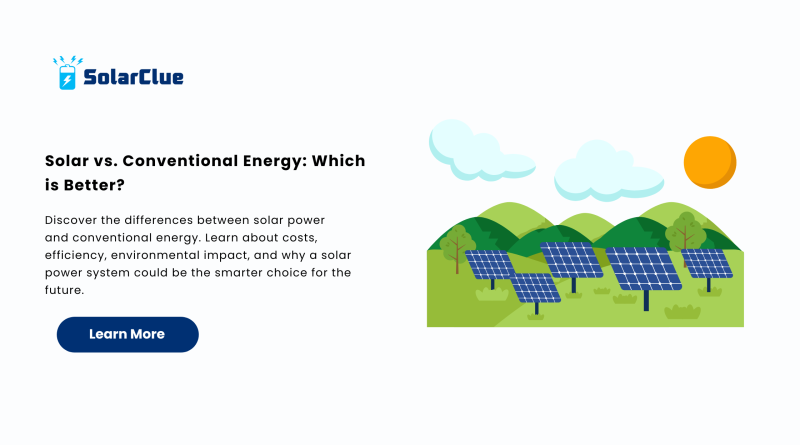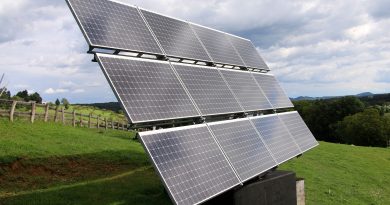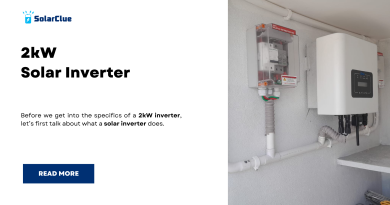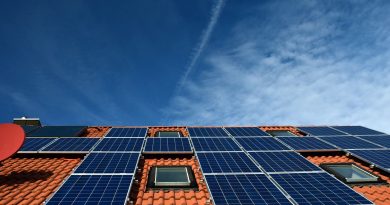Solar vs. Conventional Energy: Which is Better?
As the world faces rising energy demands and environmental challenges, the debate between solar power and conventional energy sources is gaining momentum. While fossil fuels like coal, oil, and natural gas have powered our growth for decades, their environmental impact and long-term sustainability are major concerns. On the other hand, solar energy is becoming an increasingly viable alternative, offering clean, renewable power. Let’s dive into a detailed comparison to help you make an informed choice.
Table of Contents
Understanding Solar Power
Solar power harnesses sunlight to produce electricity through photovoltaic (PV) panels. A solar power system typically includes panels, an inverter, a mounting structure, and, in some cases, batteries for storage. Unlike conventional energy sources, solar energy is renewable, abundant, and emits zero greenhouse gases during operation.
Key advantages of solar power:
-
Renewable and sustainable source of energy
-
Low operating costs after installation
-
Reduces carbon footprint
-
Can be installed on rooftops or open land
-
Eligible for government incentives in many regions
Understanding Conventional Energy
Conventional energy refers to electricity generated from non-renewable sources like coal, natural gas, petroleum, and nuclear power. These have powered industries, homes, and transportation for decades, but they come with significant environmental costs.
Key drawbacks of conventional energy:
-
Relies on finite fossil fuel reserves
-
Emits high levels of greenhouse gases
-
Associated with air, water, and soil pollution
-
Subject to volatile fuel prices
-
Dependent on large-scale power plants and transmission lines
Cost Comparison
Solar power has higher upfront installation costs due to panels, inverters, and installation expenses. However, over time, a solar power system often becomes more cost-effective due to lower electricity bills and minimal maintenance. In contrast, conventional energy may seem cheaper initially but comes with ongoing costs for fuel, transmission, and environmental damage.
Long-term savings with solar power:
-
Reduced electricity bills
-
Protection against rising grid electricity costs
-
Possible earnings through net metering (selling excess power back to the grid)
Efficiency and Reliability
Modern solar power systems can convert sunlight into electricity with an efficiency rate of 15%–23%. While production drops during cloudy days or at night, battery storage and hybrid systems can bridge the gap. Conventional energy, on the other hand, provides continuous supply but at the cost of higher emissions and dependence on external fuel supply chains.
Environmental Impact
When it comes to reducing your carbon footprint, solar energy is the clear winner. It produces no direct greenhouse gas emissions during operation. Conventional energy sources are major contributors to climate change, responsible for a significant share of CO₂ emissions worldwide.
Environmental benefits of solar energy:
-
No harmful emissions during operation
-
Reduced dependency on fossil fuels
-
Supports global climate goals
Scalability and Accessibility
Solar power systems are highly scalable — from small residential setups to massive solar farms. Conventional energy plants require large infrastructure investments and centralized operations, making them harder to deploy in remote areas.
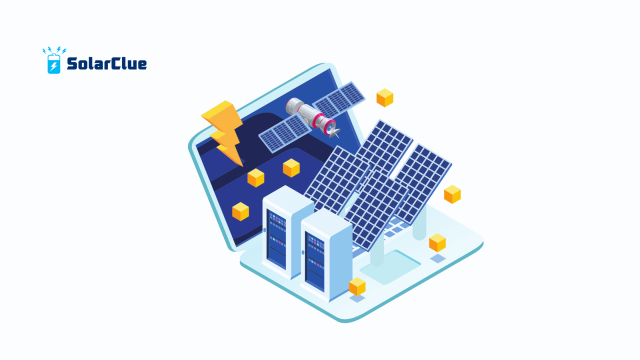
Government Support and Incentives
Many governments offer subsidies, tax credits, and low-interest loans for installing solar power systems. These incentives can significantly reduce the payback period. Conventional energy rarely benefits from such incentives in the current environmental policy landscape.
Which One Should You Choose?
If you value long-term savings, environmental responsibility, and energy independence, solar energy is the better choice. While conventional energy still plays a role in meeting global demands, transitioning to renewable sources is essential for a sustainable future.
FAQs
1. Is solar power cheaper than conventional energy?
Over the long term, yes. While the initial cost of a solar power system is higher, savings on electricity bills and incentives make it more affordable over time.
2. Can solar energy work at night?
Solar power generation stops at night, but stored energy in batteries or grid connections can supply electricity when needed.
3. How long does a solar power system last?
Most systems last 25–30 years with minimal maintenance.
4. Does solar energy require a lot of space?
Not necessarily. Rooftop solar power systems can efficiently use existing space without requiring additional land.
5. Is solar energy really eco-friendly?
Yes. While manufacturing panels has some environmental impact, the overall emissions are far lower than those from conventional energy sources.
Switching to solar energy is not just about saving money—it’s about shaping a cleaner, greener future. If you’re ready to explore your options, visit solarclue.com or check our in-depth guides at blog.solarclue.com and take the first step toward sustainable living.

